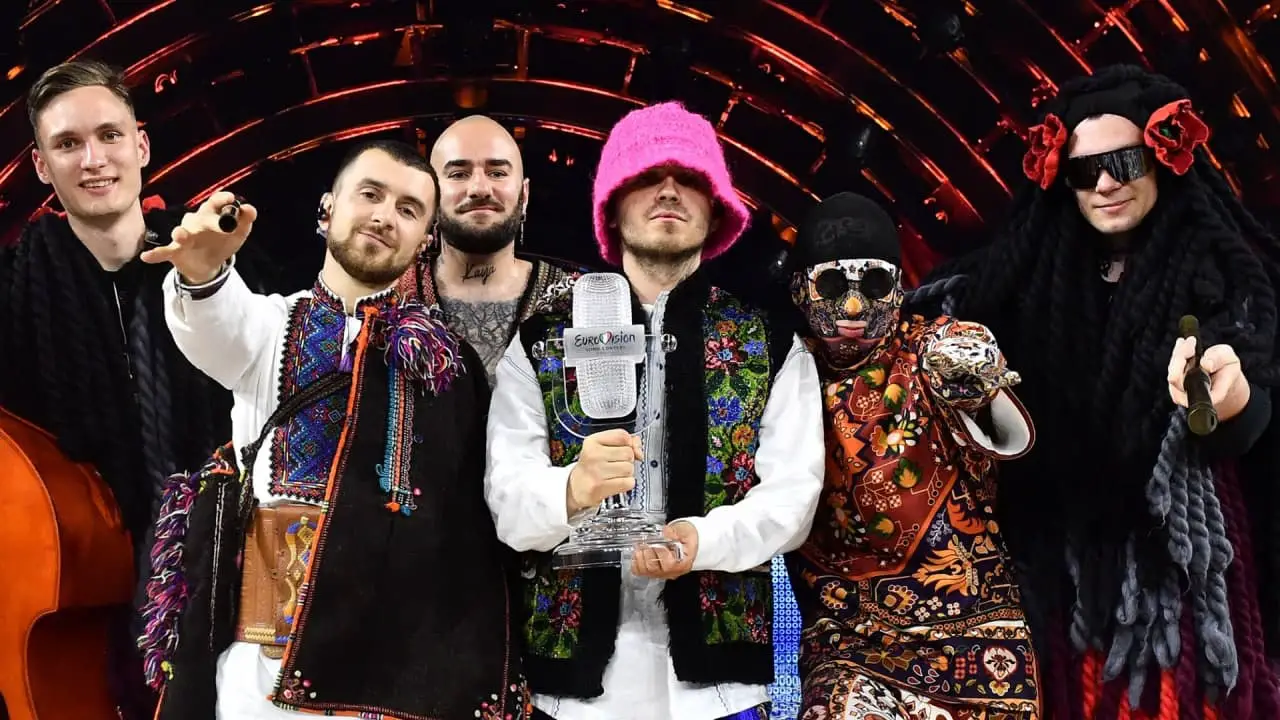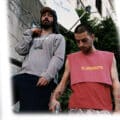The first rap that Oleh Psiuk ever wrote was a diss on his school teacher, much to the joy of his fellow classmates. He was only 15 years old, on track to become an engineer like his father. He loved music and was an avid listener of artists like Eminem, NWA, Eazy E, and Ice Cube but, at the time, could never have imagined how he would someday be working with one of the most prominent hip-hop music labels, earning a spot in Ukrainian Forbes “30 Under 30” list, and bringing hope and joy to Ukrainians everywhere through his 2022 Eurovision victory.
Psiuk was born and raised in Kalush, a city in the Ivano-Frankivsk Oblast of Western Ukraine. He loved rap music as a kid and creating verses was a frequent pastime of his friends and classmates. On the popularity of rap in his hometown, Psiuk notes: “There is a chemical plant in Kalush… and probably because of it, every second person who tries to rap here is talented.”
Once Psiuk finished school, he studied at a local engineering school. He simultaneously worked multiple jobs in order to make a living. He barely had any time to write music, and recalls these years as being difficult for his creativity. “There were years when I could write only one track in a year,” he remembers. “And there were times when I didn’t have any.” When he was 19, he moved to Lviv, the sixth-largest city in Ukraine, in order to pursue higher education. He studied automation at the Ukrainian National Forestry University, and continued to work part-time in order to support himself during his studies. It was around this time that he remembers beginning to dream of a career in music, as he realized that his heart was not in the work he was doing at school. He received an engineering degree, but considers getting it little more than a waste.
Upon his return to Kalush, Psiuk began to dedicate more time to music. He collaborated with his friend, rapper Nasheim Worryk, and released some singles before releasing his first-ever album Торба (Ukrainian for “bag”). Instead of releasing it under his own name, he created a stage name for himself: “Псючий син” (Psyuchi Sin, a play on words that derives “psyuchi” from his last name “Psiuk” but the phrase translates literally to “dog son” or “son of a bitch” in Ukrainian). He describes the album as a message to the youth of his city to not get involved with drugs or alcohol. “Our mission is to have a positive influence on young people,” he describes. “In small towns, people start using drugs already at school. Those who sell them have nothing to live for. Those who buy them have nothing to live for.”
This is why he describes his particular genre of music as “conscious” (Ukrainian: свідомий) hip-hop. He writes about personal stories and social issues, striving to maintain a strong connection to the lives and struggles of those living in small towns. He has even publicly stated that he will never advertise dangerous products like cigarettes, drugs, or alcohol in his music videos even if he is offered a great deal of money for some sort of sponsorship.
Psiuk continued to perform at local venues until 2019, when he decided to try and form a band. He posted an ad on Facebook to see if anyone would be interested in joining him, and both Ihor Didenchuk and MC Kilimmen responded. The three of them soon formed the group Kalush, named, of course, after Psiuk’s home city.
Didenchuk is a musician from Lutsk that plays 50 different instruments but is most well known for his mastery of the flute. Fascinated with folk music and ways to meld folk with hip-hop, rap, and electronica. “I am researching folklore,” Didenshuk says. “I travel around the villages and record the songs performed by grandmothers.” In addition to Kalush, he has performed with Go_A, a band which skyrocketed to international stardom after participating in the 2021 Eurovision Song Contest.
While Didenchuk is a widely-known name for his musical skill, MC Kilimmen is far more mysterious. Kilimmen isn’t his true name but a stage name — and his identity remains unknown, shielded by the full-body suit that has Ukrainian carpet patterns on it to appear like tattoos. In Ukrainian, Kilimmen literally translates to “Carpetman.” As a member of their group, he is less a person than a symbol — a representation of “Ukrainian hip-hop with a post-Soviet past.” Psiuk has described him as a sort of Ukrainian superhero. In the group, Kilimmen raps, sings, and DJs. He also dances, not only in hip-hop and breakdance styles but also the hopak (a Ukrainian folk dance).
In the band’s early days, Psiuk continued to live in Kalush and traveled occasionally to Kyiv for rehearsals. Their debut single “Не маринуй” (literally “Do not Marinate” in Ukrainian) was released in October 2019 along with a YouTube music video that gained more than 800,000 views in only two weeks. They released their second single “Ти гониш” (You are Racing) a month later in November 2019, and this time they not only attracted thousands of new fans but also the attention of the major American hip-hop record label Def Jam, who began to promote their music and make it easily accessible across streaming platforms.
Kalush continued to release singles throughout the next couple years until they finally released their debut album in 2021. The album was titled HOTIN (Хотінь, written in Latin characters) named after a neighborhood in the city of Kalush. To date, the most popular song on that album, called “Зорі” (Stars) has nearly 5 million streams on Spotify. The album was followed by more single releases and, by the end of 2021, one more album called ЙО-ЙО (Yoyo).
In late 2021, Kalush decided to create Kalush Orchestra — an extension of Kalush with a focus on folk-rap. “The band brings together traditional, ancient Ukrainian folklore with modern hip-hop sounds,” Psiuk describes. In early 2022, Kalush Orchestra entered Vidbir, Ukraine’s competition that chooses who will represent the country in the annual Eurovision Song Contest. The song “Stefania” was their entry and was written in tribute to Psiuk’s mother. Kalush Orchestra came in second place, and after the first-place winner, Alina Pash, withdrew herself from the competition due to a scandal, “Stefania” was chosen to represent Ukraine in Eurovision 2022. It was the third song sung entirely in Ukrainian chosen to do so.
Just days after Kalush Orchestra found out that they would represent Ukraine in Eurovision, Russia began what it calls its “special military operation” in Ukraine. While “Stefania” was written about Psiuk’s own mother, the lyrics were now taken to be about Ukraine itself as a motherland. Words such as “she lulled me asleep and she gave me the rhythm, and maybe my will can’t be taken away because she gave it to me” and “I’ll always find my way home, even if all roads are destroyed” resonated deeply with Ukrainians everywhere, as well as with audiences internationally.
The song earned first place in the competition, in a win that felt monumental in such a dark time. The pink hat Psiuk wore during their performance became a symbol of national strength and unity, and a train line was even named “The Stefania Express” after the song. “This victory is for every Ukrainian,” Psiuk rejoiced in his speech afterwards. “Our aim is not only to make Ukrainian popular not only in Ukraine, but all over the world. Eurovision is a very cool platform for that. We would like to create a situation where Ukrainian music has a place in the world market and for it to be really needed.”
Kalush’s music can be found online on Youtube and Spotify. Kalush Orchestra’s also has a designated Youtube page.











